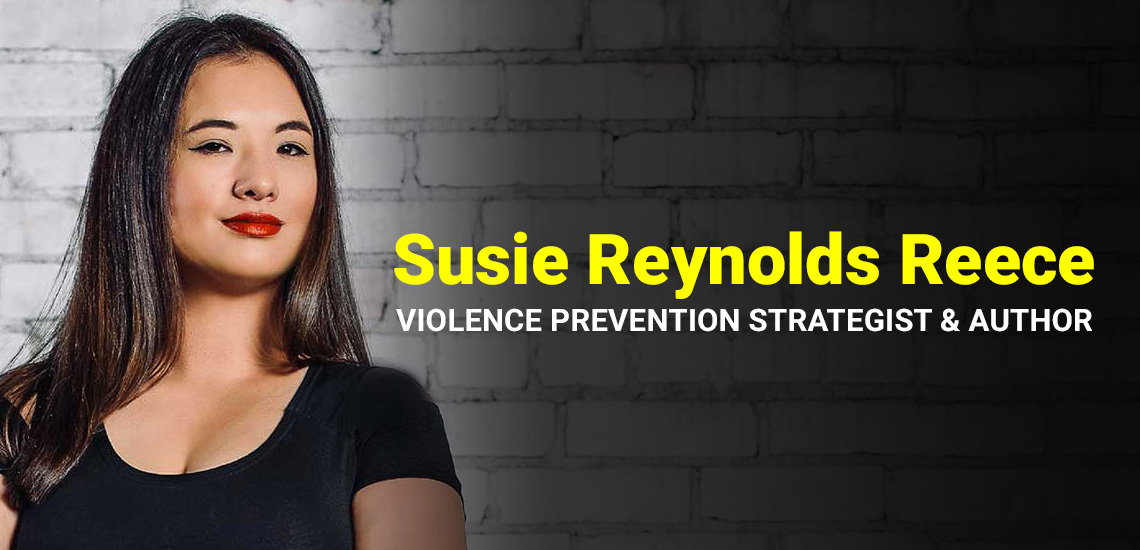AAPI Heritage Month & Mental Health Awareness Month: An Interview with Susie Reynolds Reece, Violence Prevention Strategist & Author
03 May 2021

We recently sat down with Susie Reynolds Reece, a violence prevention strategist and consultant acclaimed for her expertise in suicide awareness, suicide prevention and postvention, depression, bullying and other issues facing families and youth today. Skillfully adept at blending the realms of science and research with experiences and storytelling, she engages and compels any person to be equipped to confidently stand up for social issues. Read the full interview:
Violence against the Asian American community has been on the rise for the past year, what factors do you believe have played into this rise in hate crimes?
The rhetoric around the Coronavirus definitely plays into the rise in hate crimes. Unfortunately, it isn’t as simple as just that. Asian Americans have a long history of exclusion and racism in America. I think the history has been greatly overlooked for far too long.
In fact, I was recently at Barnes and Nobles and I just happened to walk to the US History section. Do you know what I saw? A wall of white men. I mean no offense, but I do believe there is much more to America than only that. It made me wonder, who was my Asian American role model in school? What historical figure did I learn about that meant something and deeply connected me to being an American and of Asian descent? I can’t think of one from school. Who was your Asian American role model from school?
There were many Asian Americans throughout history who fought and created paths for all Americans today. The naturalization laws we know today were because of Asian Americans. The 14th Amendment was even tested and clarified because of Asian Americans. We’ve influenced media, art, wars, and more, all for this country, and yet we are rarely if ever shown in its history. All of this keeps us from being seen as Americans.
It’s much easier to hate something you don’t know anything about, something foreign and dangerous.
How can other communities offer support and help the AAPI (Asian American Pacific Islander) Community?
Our story is different, it is as unique to us as any other story that exists. Even within the term Asian, there are many more facets and stories that can be found. That makes it difficult to learn them all, but it doesn’t mean it’s impossible to learn about who we are and what is impacting us today.
The first thing that can be done is to listen to the pleas for support and compassion. We need everyone, from every community, to stand with us against hate and hate crimes. Not just for Asian Americans, but for us all.
Companies, nonprofits, schools, every organization can incorporate diversity, equity, and inclusion policies and programs into their processes. And not just a once a year, check the box kind of training or class. These programs should be adaptive, vary, and ongoing. That’s how we learn and evolve as a country and as people. The world has shrank so much in the past few decades because of the internet and how it allows us to connect from one side of the world to the other, we as people have to expand our knowledge so we can evolve globally.
How do marginalized communities prepare for hate and violence? Is there a way to ever be prepared?
I don’t know that there is a way to ever truly be prepared for hate and violence. It takes such a toll on a person’s spirit to be hated for simply existing as they are. I do know many who have early (albeit sad and difficult) conversations with their children and those in their lives about hate and violence. I know many parents who have had to sit down over the past few weeks to talk about skin color and our eyes, and how people hate us for those reasons. No one wants to have these conversations with their children. It breaks my heart simply thinking about it.
An easy and more necessary conversation should be the one that is had when subtle racism is showcased. As adults, we have to stop accepting racism in any form. We need to let everyone know where we stand when it comes to hate and violence.
How do marginalized communities use peaceful protests and demonstrations to address the racial injustice in our country?
Protests are the physical representation of speaking out against discrimination. When we gather and show up, we are letting those in power know that we demand to be seen and heard. We are demonstrating an injustice must be addressed and recognized because we are refusing to sit back and do nothing about it. Historically, justice hasn’t simply occurred. It has been demanded by the people of those given the power to make it so. Our voices, our actions, our financial choices, these are all ways for communities to stand up and be counted. This is how we impact and influence change, through action and refusal to accept injustice as a norm.
Your specialty is in suicide prevention and resilience, how do you think the pandemic has impacted both of these issues?
That’s a tough one! I think on a large scale that it’s still a little too soon to have statistics to show how suicide rates have been for the past year. I’m hoping that they haven’t risen drastically like many other issues have. On a smaller scale, I saw a lot of people in my circles who struggled in one way or another. Many still are. Sometimes as you near the end of the tunnel, it actually gets darker before you reach the light of day.
I do believe that we have all been tested this past year, as individuals, and as a whole. It’s so easy to see the pandemic as something awful that happened to us all. For some, too many, lives were lost and there is no greater loss than that. I don’t dare make light of that loss, but at the same time perhaps we can shift how we view this past year. Maybe the pandemic didn’t simply happen to us, maybe it’s happening for us. Perhaps there are greater lessons that we all needed and it took the world closing down for us to finally realize how important we all should be and are to one another. Life has been fast paced for quite some time now, and the pandemic slowed down the pace for us all. Hopefully we can gain insights and appreciation from even something as awful as a global pandemic. Afterall, how often does everyone on the planet have a shared experience? This is something we can all connect over for decades to come.
Resiliency is a big buzz word right now. We are constantly pressured through the media to be “resilient” and “keep the faith.” Understanding that doesn’t work for everyone, do you have any tips that would help someone know when they need to seek professional help?
There are several ways a person can determine if they might need a little extra help. One simple way is to look at your health. Key areas that are first impacted by an abnormal amount of stress are sleep, memory, and decision making. Are you not sleeping enough, or are you sleeping too much? Are you struggling, beyond your normal, to recall simple information? Are you having a hard time focusing and making your day to day decisions? These could all be signs that you may need extra care. That care could be either a physician or a mental health professional, depending on what your body needs.
If you’re not sure about the above answers, you can also go online and take a stress, or depression test. Both can be found for free at a number of sites. These tests normally only take about 15 minutes or so and can help you realize you may be dealing with more stress or life changes than normal.
The most important thing to remember about any of this is that it is normal to struggle from time to time. Especially as you are experiencing difficulty in life. Struggling doesn’t mean anyone is weak, it is simply an indication that you may need an extra hand to help you lift the weight of life.
The conversation around anti-Asian bias, hate & violence, and mental health stigma has a lot of intersection. So Susie, where do you think we can go from here to help eradicate both?
I think it should be an intersectional solution. Complex issues, require complex solutions. First, we all need to do some deep introspection and identify our implicit biases. We all have them, we need to ask ourselves how we as individuals can be better humans.
Then, we need to refuse to allow hate of any kind, and violence of any kind into any space in which we exist. That might mean cleaning house on your Facebook list and getting rid of toxic people who have repeatedly made racist and threatening comments. That might mean setting boundaries for Grandpa not to speak in certain ways around you. This isn’t going to be easy, and you might upset some people along the way, but in the end you will have set boundaries for what you will and will not tolerate.
Finally, we need diversity in our education systems. And I don’t just mean the people who are teaching. We need to be teaching our children about the complex histories of America. We need to highlight how marches, rallies, and protests often came after some of the harshest injustices. We need to share the stories and faces of those who paved the way for marginalized communities, and for America. We need to teach our children and future leaders that there are people from all of our pasts who look like some of us, loved like some of us, and lived for all of us. Because until we can see ourselves in our past, we cannot imagine ourselves in our future.
